The Sweeney
Drama series about crime and policing are ten-a-penny nowadays, with most being so forumalic that even the lamest comedian takes the piss, but there was a time when the real work of the police was ignored by television. Before 1972, the portrayals of police work that the British public were used to were those in Dixon of Dock Green, or Z Cars, with police doing their jobs with good humour and occasionally giving a petty crook a telling-off. The nastier, more violent work of the Serious Crime Squad (or, as they were popularly known, The Flying Squad) went unnoticed by television drama during the famously liberated Sixties, a situation that a group of young, talented writers were about to change.
 |
The impact of The Sweeney cannot really be underestimated. Here for the first time was a realistic perspective on the policing of serious crime in London, featuring the cruelty and violence of organised crime as well as the impact of those actions on members of the Metropolitan Police. It can be said that the arrival of the series was timely, given that by 1974, the vibrance and optimism of the Sixties had given way to a tougher life for many in Britain, with strikes by the miners causing a reduction of the working week to three days and an eventual election defeat of the incumbent government. In The Sweeney, the public saw the grim reality of policing, with not just violent punch-ups, but with a look into the lead characters' personal lives. John Thaw brought a permanent sense of hurt pride to Regan, facing an uncertain future due to his refusal to conform to new ways of policing. Dennis Waterman brought a troubled Carter, worrying about the impact of Regan's frustration on their work and feeling pressure from his wife to give up a job that he loved so much. Regan was a veteran Flying Squad member, using his large network of contacts to get the results he wanted, whilst Carter was younger, trying to learn from Regan, but not to become a copy of his embittered superior. The general theme of the series: the maverick old hand, fighting against authority to get results his way, has become something of a cliche, but was revolutionary for its time, and never becomes formulaic within The Sweeney due to the strong writing and quality of both the performances and the production. The series has become a true classic of British drama, and has inspired many within the industry, as well as acting as a rather unusual recruitment advertisement for the Metropolitan Police. An example of just how influential the series was can be seen in the recent successful BBC drama Life on Mars, whose writers have emphasised how they used The Sweeney as their model for a cop show set in 1973 with a Detective Inspector from 2006, and managed to create a clever revisiting of the era through modern eyes, whilst leaving the viewer to assess the progress made over the intervening 33 years.
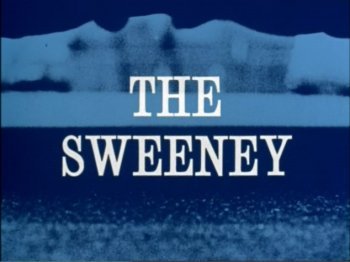 |
The story of The Sweeney really starts with the Kennedy-Martin brothers. Troy Kennedy-Martin was a successful writer for the BBC when he managed to get his brother Ian to join, Ian having already written a couple of plays, one of which Troy adapted into The Italian Job. Ian was soon invited to co-write Redcap, a popular Sixties series about the Military Police, with John Thaw, an upcoming actor, in the role of a Detective Sergant. John became a close friend of Ian's, and it was through this friendship that Ian began to think of the character Regan, a Detective Inspector. Ian's friendship with a member of the Flying Squad completed the picture when in 1972, a new Commissioner of the Metropolitan Police deemed the old methods of intelligence gathering ineffective and open to corruption, as a major part of this work included members of the Flying Squad forming contacts within the criminal community. The impact of this change on the Metropolitian Police was significant, with 300 officers resigning as a result, and Ian was interested in how his friend was going to adapt after having been told that the way he had worked for years was no longer appropiate. Ian pitched his idea to the new company Euston Films (linked to Thames Television), who welcomed it, keen as they were to ditch their crime series Special Branch which had been a failed attempt to inject more reality into the portrayal of police work.
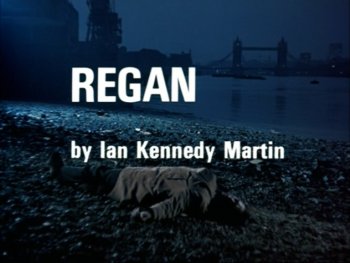 |
A feature-length pilot was made, simply called Regan, with Ian fighting both to get John Thaw cast as Regan and to retain control of the script. Partly as a result of this struggle, Ian Kennedy-Martin made sure that the essential aspects of The Sweeney were in place: namely, John Thaw as Detective Inspector and the character Carter continuing to be his Detective Sergeant before leaving Euston Films amicably. His brother Troy stayed to write some episodes, and even though The Sweeney had many writers, Ian's influence ensured that the feeling of the series does not change throughout the 4 series made.
Regan is an effective backstory to the The Sweeney, as it features Regan investigating the murder of a policeman and working against the rules of a rapidly-changing Scotland Yard in order to find the killer his way. The changes within the police, and Regan's reaction to them, means that he is fighting for his career through this investigation, bringing a greater tension to the story. Regan persuades a reluctant Detective Sergant Carter to join him, due to Carter's knowledge of the area in which the murder was committed (South London) with Carter setting the tone of their relationship by warning Regan that he didn't approve of his ways of working during a previous collaboration. However, at the end of the film, Regan tells Carter that he's the same type of policeman as himself, and Carter agrees, with Regan having just been informed by his Superintendent that although he wasn't suspending him, he could have achieved his aims through the proper channels, and that he'll have to work within the new guidelines in future as part of a team. This sets the struggle for the series between Regan and his superiors.
The pilot also introduces the permanent theme of Regan's devotion to his job above all other aspects of his life, with an awkward meeting with his ex-wife, who informs him that she intends to marry another man, and Regan having to convince Carter to put his job before his wife's happiness. Regan is a perfect example of the production values from Euston Films, as it is beautifully filmed, and, as the script is mainly the work of Ian Kennedy-Martin, it is tightly-plotted and provides the emotional background to the story without over-egging the pudding. Another aspect of the pilot which is continued to the series is the finely-judged soundtrack, very much of its time and compliments the period piece of 1970's London.
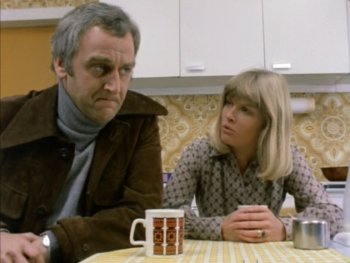 |
The true impact of the job is realised through two of the best episodes: Abduction, at the end of the first series, and Hit and Run in the second series. Abduction deals with the kidnap of Susie Regan, DI Regan's 8 year old daughter. The best performances of the episode come from Thaw and Janet Key as Regan's estranged wife, trying to cope with their distress over the disappearance of their daughter and the disintegration of their relationship. Regan's characteristic pose of a cornered animal is heightened by his anger and frustration at the apparent lack of action from Division. Despite warnings from his Detective Chief Inspector, Regan decides to do his own investigation when he gets a warning from the kidnappers not to do anything to find Susie or to tell anyone about their warning, asking Carter, who is on sick leave, to help him, much to the annoyance of Mrs. Carter. The strain tells on Regan's wife, who ends up with a prescription for anti-depressants when she hangs around outside Susie's school in vain hope of seeing her walk out the gates. Susie's teacher, played by Patricia Maynard, a future Mrs. Waterman (and the mother of Hannah), is forced to give her support in the absence of Regan, who, as always, is too busy doing his job. However, the series never takes sides on this issue, leaving the viewer to decide whether the objections of the wives are justified, and whether Regan is right to pursue his job at the expense of everything else in his life.
The structure of the episode is odd by modern standards, as Susie is found by Carter and Regan about halfway through, with a comparatively easy (by Sweeney standards) rescue, as the one of the two women holding her soon gives her up, seeing the folly of continuing to resist a determined and angry father. The rest of the episode deals with Regan's pursuit of the group behind the kidnapping, with a suitably action-packed capture by Regan and Carter with back-up from their colleagues. Carter stops Regan just as he is on the point of giving one of the gang a beating, showing the kind of level-headedness that became his most famous characteristic. It seems a little strange to see what appears to be the climax of the episode so early on, given the modern habit of saving the climax until late in the episode, but it doesn't spoil the rest of the action, which also has an important point to prove in Carter holding back Regan's base instincts. The episode ends on a typically caustic joke by Regan, after a tender moment with his wife is interrupted by a phone call requiring his presence on duty. He spits ironically: "Anyone would think that Regan was the only copper in London!"
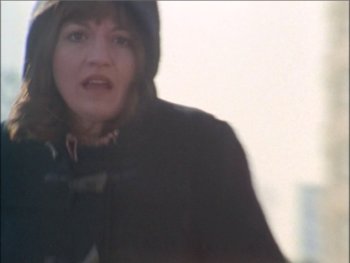 |
Hit and Run has a harder job to do than Abduction, and could possibly been interpreted as symptomatic of a greater confidence in the writing team, as it has to deal with an incident that cannot have such a happy ending: the killing of Carter's wife by a hit and run driver, who has mistaken her for her colleague due to Alison Carter borrowing her coat. The colleague, a French teacher, is trying to escape from her prior involvement with a local gang, led by a excellently menacing Patrick Troughton, playing so against type that it is difficult to recognise him at first. Again, the episode looks at the Carter's marriage, and emphasises Alison Carter's disappointment with Carter letting her down for social occasions when his job calls, but still makes a point of showing the love between them, as, despite George's devotion to his job, they are still a normal young couple. Although The Sweeney was always a masterclass in direction, this episode has particularly good shots, with a conversation between George Croft and the teacher's boyfriend in a car being filmed from the back of the car, and brooding shots of a grieving George Carter through the blinds in the Carter's kitchen. The episode also has some of the best scenes of the whole series with Regan and Carter, with Regan comforting Carter with the aid of a whisky bottle whilst they talk about how their job always ends up becoming personal, and George expressing all the emotions that you would expect of a man recently widowed. However, this is by no means a maudlin episode: things soon move on with George Croft discovering that the wrong woman has been killed, and that she was a copper's wife. Possibly troubled by guilt, Croft stands outside the church at Mrs Carter's funeral.
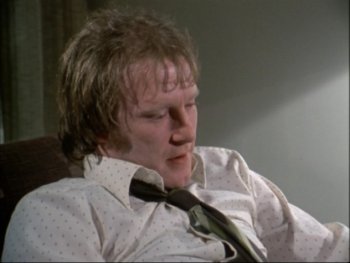 |
Regan, unsurprisingly, throws himself into the investigation of Alison Carter's death, and is contemptous of DCI Haskins giving George a week's compassionate leave, telling him that George was back on duty a couple of hours after his own wedding. For obvious reasons, Haskins doesn't want Carter involved in the investigation of his own wife's murder, but, as might be expected, Regan takes little notice. Their investigation starts with the headmaster of the school Alison Carter worked at, with the audience having seen the colleague fleeing her flat in the knowledge that she was the intended victim. The headmaster reveals that Alison's colleague made regular trips to France with her pupils, and fled both her flat and her job with no forwarding address after he informed her of Alison's death. He tells Regan and Carter that she looked frightened, which, along with Regan's knowledge of several criminals who would benefit from regular runs to France, help them fill in the gaps. They find their girl just after her boyfriend does, who wants to flee Croft himself, having been threatened with death if he doesn't bring her to the gang. She turns out to have little idea about the true worth of what she smuggled for the gang, showing herself to be rather naive despite her obviously well-educated background. The episode ends with Carter catching Croft himself, and experiencing the same emotions as Regan when he caught the mastermind of his daughter's abduction. However, Carter immediately thinks better of it, and lets Croft be arrested, telling a puzzled Regan that he can do a lot more damage through the proper channels.
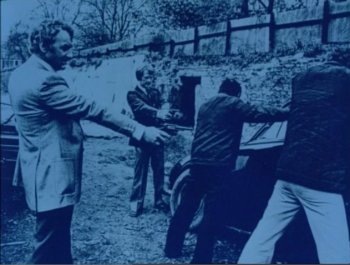 |
Carter and Regan are staggeringly well-realised characters, partly down to the excellent scripts, and also because two of the best actors of their generation were cast in the roles. Dennis Waterman talks in one of the episode commentaries about how himself and Thaw would improvise about their characters' lives outside their jobs in order to make them more real, and you don't ever doubt that Thaw and Waterman believe every line they speak. Waterman brings Carter's relative lack of cynicism out in his performance, and also giving him a mature outlook that belied Carter's supposed age of 26. Even Regan, at a depressingly war-weary 35, has trouble dealing with the job with the same maturity as Carter, and although Regan is the obvious star of the series, Carter comes out looking the more impressive man. Given the fantastic perfomances of everyone involved, the beautiful production values, and the thought-provoking scripts, it's no wonder that The Sweeney has become the most influential cop series in British television. Watching Life on Mars, you can see the parallels between Gene Hunt and Sam Tyler and Regan and Carter clearly. Regan also managed to inspire countless comedy writers, including Ben Elton, who made his fantastic Inspector Grim in The Thin Blue Line a wannabe Regan. The writer of Abduction, Trevor Preston, explains in the commentary that the Sweeney gave him more freedom than other shows of the time, and that he's proud of his involvement in a series that was based on the idea of doing something full of joy and wasn't pretentious. Amen to that.
About this entry
- By Tanya Jones
- Posted on Monday, November 27 2006 @ 12:10 am
- Categorised in TV
- 1 comment

Excellent article, that. It's been years and years since I've seen an episode of this, and I'm now inspired to seek out series 1 from 'somewhere'.
By Jonathan Capps
November 28, 2006 @ 5:28 pm
reply / #